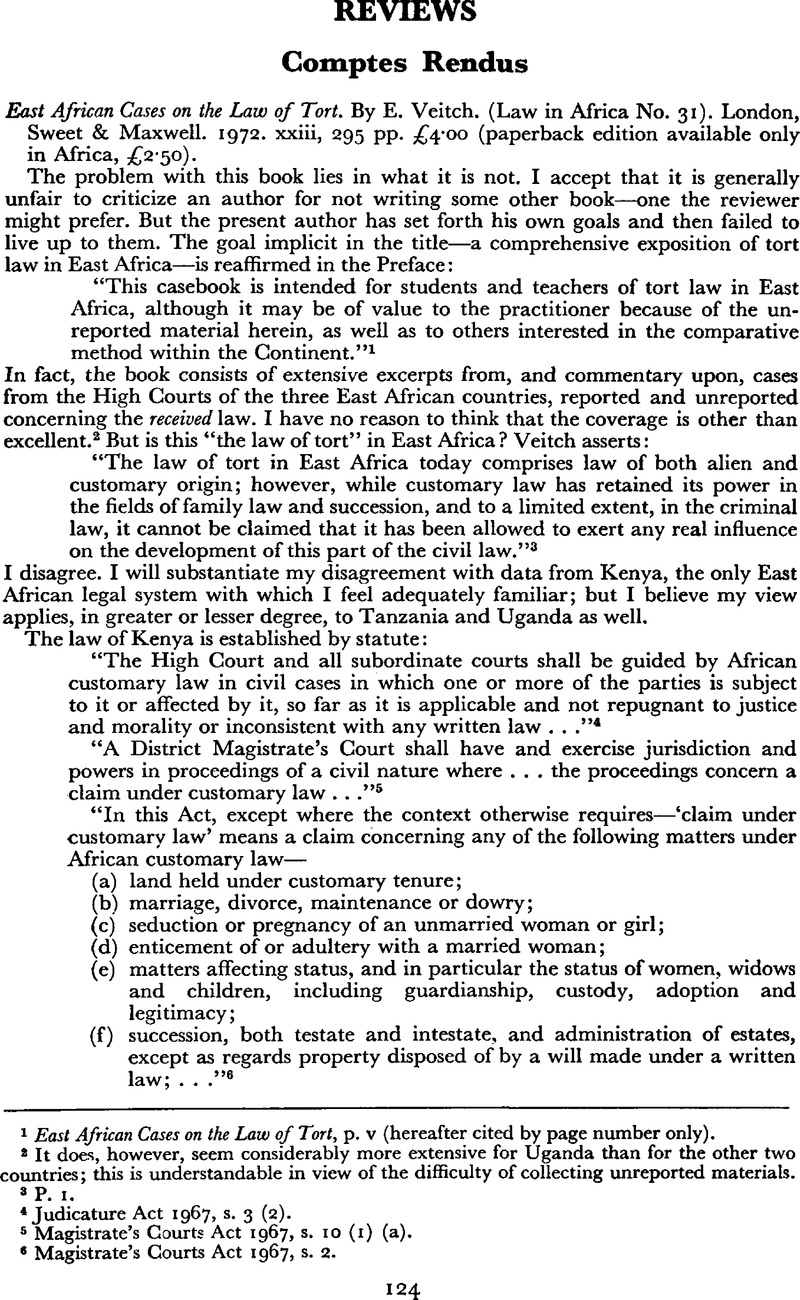Published online by Cambridge University Press: 28 July 2009

1 East African Cases on the Law of Tort, p. v (hereafter cited by page number only).
2 It does, however, seem considerably more extensive for Uganda than for the other two countries; this is understandable in view of the difficulty of collecting unreported materials.
3 P. 1.
4 Judicature Act 1967, s. 3 (2).
5 Magistrate's Courts Act 1967, s. 10 (1) (a).
6 Magistrate's Courts Act 1967, s. 2.
page 125 note 1 The decision from which the appeal was being taken was: Kamanza s/o Chiwaya v. Manza w/o Tsuma, Mombasa Resident Magistrate's Civil Appeal No. 8/69 (18.9.70), dismissing appeal from Kinango District Magistrate's Civil Case No. 198/68 (no date). Other claims for bloodmoney had been heard twice before by the court at Kwale. Each was granted, and in each case an appeal was taken to the Resident Magistrate at Mombasa. Different magistrates heard the two appeals, one allowing the appeal, the other dismissing it. See Mombasa Resident Magistrate's Civil Appeal No. 66/68, dismissing appeal from Kwale District Magistrate's Civil Case No. 35/68; and Mombasa Resident Magistrate's Civil Appeal No. 13/69, allowing appeal from Kwale District Magistrate's Civil Case No. 123/68. (The same District Magistrate sits at Kwale and Kinango, which are both within Kwale District and serve the Duruma people.)
page 125 note 2 P. 1.
page 125 note 3 I have stated my reasons more fully in a review of Spalding, Hoover and Piper, ‘“One Nation, One Judiciary”: The Lower Courts of Zambia’, in a forthcoming issue of African Law Studies.
page 125 note 4 These figures are taken from what was then an unpublished report of the Judicial Department for the years 1966–70.
page 126 note 1 P. 7.
page 126 note 2 See R. L. Abel, “Case method research in the customary laws of wrongs in Kenya, Part II: statistical analysis”, (1970) 6 E.A. L.J. 20, 36–50.
page 126 note 3 P. 2.
page 125 note 4 P. 3.
page 127 note 1 This table is compiled from the record books of the individual African Courts, supplemented where necessary by case records. Because of the difficulty of classifying cases taken from different customary legal systems, it should be read as only a rough indication of the diversity of litigation. It is not even an exhaustive enumeration of customary tort cases, for many cases brought as private prosecutions under the Penal Code also seek compensation according to customary tort law.
page 127 note 1 Issued by N. A. P. Methven, Acting Registrar, High Court of Kenya, 17.12.69 (Ref: 40/3 Vol. 11/177).